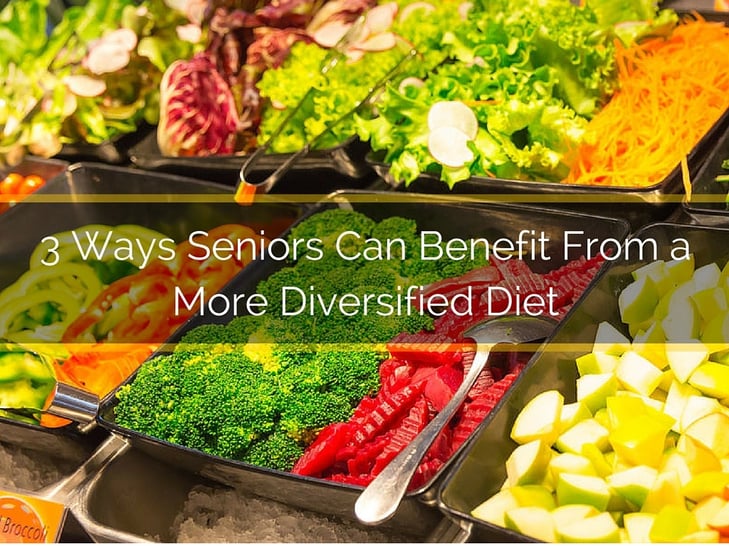
Variety is the spice of life.
How often have you heard that expression through the years, and pondered its exact meaning? When it comes to senior life, the saying may be most pertinent to dietary habits. Variety, in terms of food, may just be the catalyst for staying healthy, feeling more alert, and preventing or minimizing some of the common effects of aging.
Health, Nutrition and Calories
As we age, it is only too obvious that our lifestyles and bodies change, and as we change like this, so too do our dietary needs. Many seniors are less active than their younger selves, for example, so excess calories can do more damage. The composition of daily meals tends to change as well. Seniors don't need to "bulk up" with carbohydrates for energy, but the need to better nourish body and brain function increases.
A well-balanced diet is important at any age. The trick is in knowing what balance means at a particular life stage. Age should not mean a license to indulge in too many sweets, nor should it rely on "favorite" food choices or "no-fuss" meals like tea and toast. Variety and spice are important in a senior diet plan.
The Best Diet Plans
While there is no perfect diet that fits the needs of all senior citizens, consuming a diversified sampling of basic food groups is beneficial in important ways. Dieticians recommend broad guidelines that encourage heart health, fight diabetes, emphasize weight control and are easy to follow. Older adults who adopt reasonable eating habits can continue to enjoy life longer, and enhance overall health and wellness well into their senior years.
The basic tenets are fewer calories, more protein and less fat. Primary benefits include:
- Increased resistance to illness and disease
- More energy and a stronger body
- A better attitude and zest for living
Health professionals agree that older bodies requires fewer calories. Overweight and obesity lead to major problems in senior health, including heart attack, stroke and diabetes. But neglecting nutritional needs contributes to other problems.
Specific Recommendations
Older adults need plenty of protein, but it doesn't have to come from red meat. Alternative sources of protein bring other benefits.
- Dairy products like cottage cheese or yogurt are a great addition to any meal, offering protein and also providing calcium for strong teeth and bones.
- Fish with its omega-3 fatty acids is heart healthy and good for the immune system.
- Beans are loaded with fiber
- Soy products help keep cholesterol in check.
- Eggs are economical and versatile.
- Oatmeal is an alternative and healthy breakfast choice; and can be served at any meal.
- Nuts and cheeses make great snacks, or are tasty desserts when combined with a bit of fruit. Almonds, pistachios and cashews are packed with Vitamin E and minerals.
- Broccoli has more protein than most other vegetables.
Senior appetites may not be robust, and sometimes the sense of taste and smell are diminished as well. Food that is imaginative, spiced with interesting flavors and attractively served is more appealing. Frequent smaller meals benefit senior life schedules. Besides, snacking is fun!
Aim for Balance and Control
Lowering fat consumption and eating more healthy vegetables and fruits is good advice for any age. Mediterranean and South Beach plans, in addition to the DASH Diet, are endorsed by nutritionists; they can make sticking to a healthy eating regimen a piece of cake. Also, an occasional piece of cake, bite of chocolate or glass of wine is not only allowed, but encouraged.
Whether you prepare your own meals, eat out or dine in a community, many senior life and health needs can be met in the kitchen.












